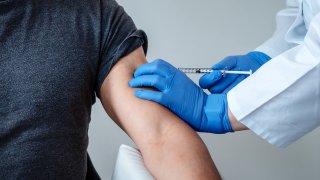
- The U.S. should be able to distribute enough coronavirus vaccine doses to immunize 100 million people by the end of February, President Donald Trump's coronavirus vaccine czar said.
- It will be enough doses to protect a "significant portion" of the most at-risk Americans, which are the elderly, health-care workers and people with preexisting conditions, said Dr. Moncef Slaoui.
The U.S. should be able to distribute enough coronavirus vaccine doses to immunize 100 million people by the end of February, President Donald Trump's Covid-19 vaccine czar said Wednesday.
That will be enough doses to protect a "significant portion" of the most at-risk Americans, which are the elderly, health-care workers and people with preexisting conditions, Dr. Moncef Slaoui, who is leading the Trump administration's vaccine program Operation Warp Speed, told reporters during a news briefing.
There is a chance the U.S. could have more doses than expected that month if Johnson & Johnson's potential vaccine is authorized by then, Slaoui said, adding he expects the company to release key late-stage trial data in January.
The federal government is expected to ship 6.4 million doses of Pfizer's vaccine to jurisdictions across the nation within 24 hours after an emergency use authorization from the Food and Drug Administration, Army Gen. Gustave Perna, chief operations officer for Operation Warp Speed, said at the same briefing. Officials plan to ship 12.5 million doses of Moderna's vaccine following an emergency authorization, he added.
The planning "is not about getting in front of the EUA," Perna told reporters. "It is making sure we have everything locked so when EUA decisions come, distribution to the American people becomes immediate."
Money Report
The briefing Wednesday came as states prepare to distribute a Covid-19 vaccine in as little as two weeks. Moderna and Pfizer late last month requested emergency clearances from the FDA for their Covid-19 vaccines. The reviews by the FDA are expected to take a few weeks, and the agency has scheduled a meeting for Dec. 10 to discuss Pfizer's request for authorization.
Earlier Wednesday, the U.K. became the first country to authorize the Pfizer vaccine for emergency use, marking another step in the global battle against the pandemic.
Initial doses will be limited as manufacturing ramps up, with top U.S. health officials predicting it will take months to immunize everyone who wants to be vaccinated against Covid-19 in the United States. The federal government has deals lined up with several drugmakers to buy some of their first doses.
A Centers for Disease Control and Prevention panel on Tuesday voted 13-1 to give health-care workers and long-term care facility residents in the U.S. the first coronavirus vaccine doses once it's cleared for public use. There are roughly 21 million health-care workers and 3 million long-term care facility residents in the United States, according to the CDC.
Medical experts have previously advocated for health-care workers to get the vaccine first, followed by vulnerable Americans -- the elderly, people with preexisting conditions and essential workers. Children and young adults are expected to get the vaccine last.
Before the vote, Dr. Nancy Messonnier, director of the CDC's National Center for Immunization and Respiratory Diseases, said most states and local jurisdictions expect it to take three weeks to vaccinate all of their health-care workers. Pfizer's and Moderna's vaccines require two doses about a month apart. Both vaccines are using messenger RNA, or mRNA, technology. It's a new approach to vaccines that uses genetic material to provoke an immune response.
Perna said Wednesday that the federal government has asked states to finalize plans for distribution by the end of this week.
States have already submitted early plans to the CDC on how they intend to inoculate some 331 million Americans against Covid-19 once a vaccine is approved. The CDC has allocated $200 million to jurisdictions for vaccine preparedness, though much of that funding hasn't trickled down to the local level.






